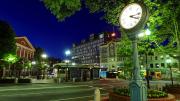In normal times, Harvard Square looms large in the memory of alumni and serves as a magnet for visitors from around the world. But with the coronavirus pandemic sending students home from campus, curtailing tourist traffic globally, and restricting restaurants’ and retailers’ normal operations, the businesses that enliven the street—70 percent of them still locally owned and operated—are under considerable pressure. Change among such businesses is nothing new: Bailey’s Ice Cream, the Wursthaus, the Tasty, the Curious George Store, Schoenhof’s Books, the Blue Parrot, Elsie’s, Janus, Café Algiers, and more have departed over the decades— the natural ebb and flow of enterprise.
But this time, Square businesses confront a very different risk. Much of the Harvard community left in March and won’t be able to return for an unknown period of time. Most students will be absent at least until late January, with many faculty and staff members working remotely, too. Tourism has halted. At the beginning of March, 392 businesses were open in the Square. By mid-April, only 15 restaurants and five retailers were operating. Every owner had to face the questions: What do we do? How can we adapt? Can we survive this?
As of early August, 13 had announced their permanent closure: Café Pamplona, Parsnip, Alley by Verizon, Papyrus, Bo Concept, Hempest, Legal Seafood, Goorin Bros Hat Shop, Wellbridge Athletic Club, GNC, Lush, Staples, and Ann Taylor. Bartley’s Burger Cottage is up for sale, with Dickson Bros. Hardware rumored to be for sale imminently. This story examines the circumstances facing local businesses as they endure a sustained period of much-reduced customer traffic and possibly prolonged state limits on capacity and other critical operating criteria.
Restaurants Forced to Pivot
The Harvard Square Business Association's (HSBA) small business advisory committee is helping to allocate limited outdoor space—a suddenly valuable commodity for restaurants that can serve only small numbers of patrons inside. “Money needs to be considered in how to build outdoor dining spaces,” says HSBA executive director Denise Jillson. “Many small businesses need to decide if it’s worth creating outdoor space, or if it’s worth opening if only a few people can safely fit inside. We still need to behave properly—we’d rather slowly open up businesses than go backwards.”
For a fast-casual place like El Jefe’s, it’s hard to become a destination in a large urban center and build up a local clientele. Owner John Schall has had to focus on doing takeout (which accounted for 35 percent of pre-crisis sales) and delivery (20 percent). “Delivery went from 20 percent to 72 percent of our total sales,” he says. Revenue dropped about 70 percent the week of March 16, when the University shut down campus at the beginning of spring recess. Now, he says, “We’ve gained back about 50 percent of that loss since, with more locals coming in.”
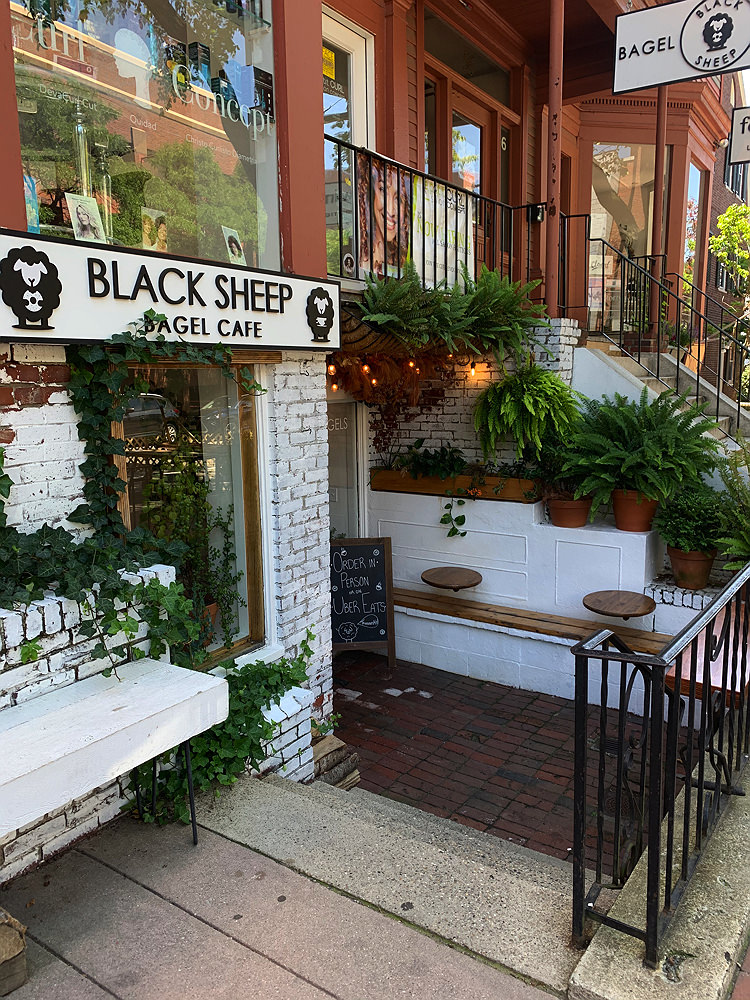
Black Sheep Bagel Café
Photograph by Kristina DeMichele/Harvard Magazine
Smaller establishments like Black Sheep Bagel Café needed to scale back supply in order to meet the reduced demand. “I wanted to keep all my staff,” co-owner Manny Ramirez says, “so we decided to bake 100-200 bagels a day, rather than our normal 400-500 a day. We’ve essentially been operating at 30 percent capacity.
Darwin’s had to temporarily close its newest location on Putnam Avenue and lay off two-thirds of its staff in March. “Business, I can tell you, dipped pretty quickly at the beginning and now has somehow leveled off,” owner Bartholomew Cass says. “We get a lot of online and call-in orders, and we get a decent amount of in-person orders. We haven’t opened indoor or outdoor dining yet.”
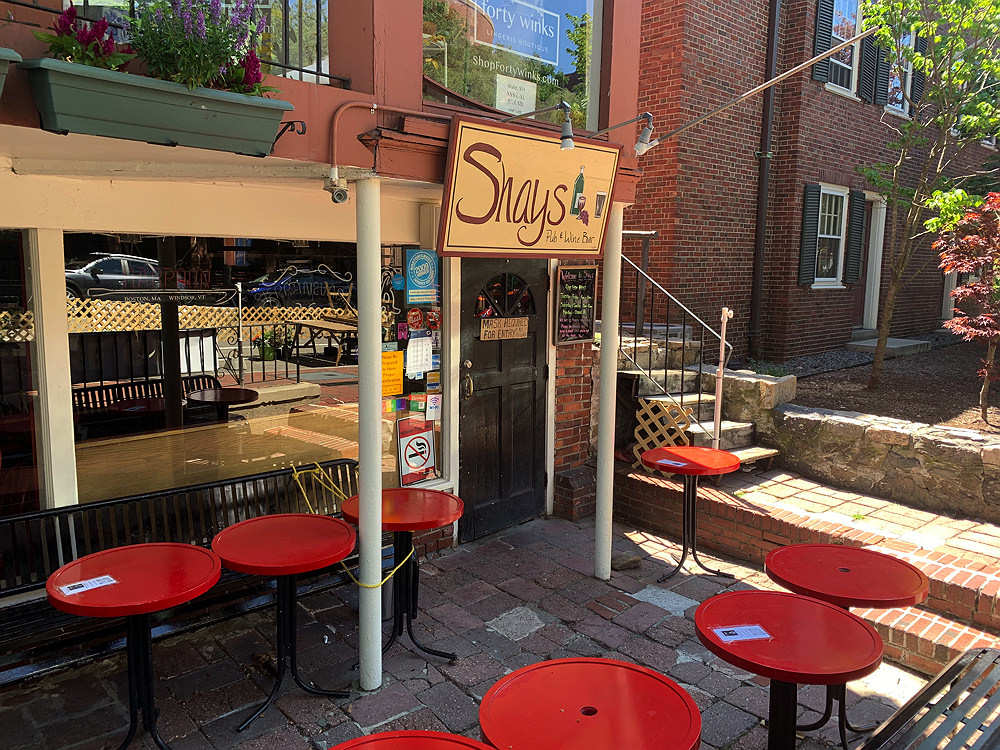
Shay's
Photograpah by Kristina DeMichele/Harvard Magazine
Shay’s, the small but comfy pub that’s been around since 1984, tried opening for takeout initially, but that proved infeasible. When Shay’s reopened in July, it was able to utilize its patio and an additional patio from the city, but capacity is still an issue. “The patio from the city has about 30 seats,” says co-owner Rosaline Kovacs. “Our own patio can only seat 12 now, while it could normally seat 30. We have three tables inside, but they’re barely used. We used to be able to seat 48 inside and fit 72 with standing room. We need to pack people in—if there’s no vaccine by the spring, then I don’t think we’ll survive.”
Other restaurants have taken this time to revamp. Grendel’s Den, which celebrated its fiftieth anniversary in February, decided to start a grocery program. “We sold perishables and produce for about four to six weeks and made about 68 deliveries a week to people’s homes,” says owner Kari Kuelzer. “As things started to open up, our grocery program subsided so that we could devote ourselves to outdoor dining.” For now, Grendel’s indoor dining area is going to be converted into a store with branded apparel, accessories, bar snacks, and food items that people can take to go, as well as a cocktail program. According to Kuelzer, “Rolling out a program like this would take three to six months in normal times.”
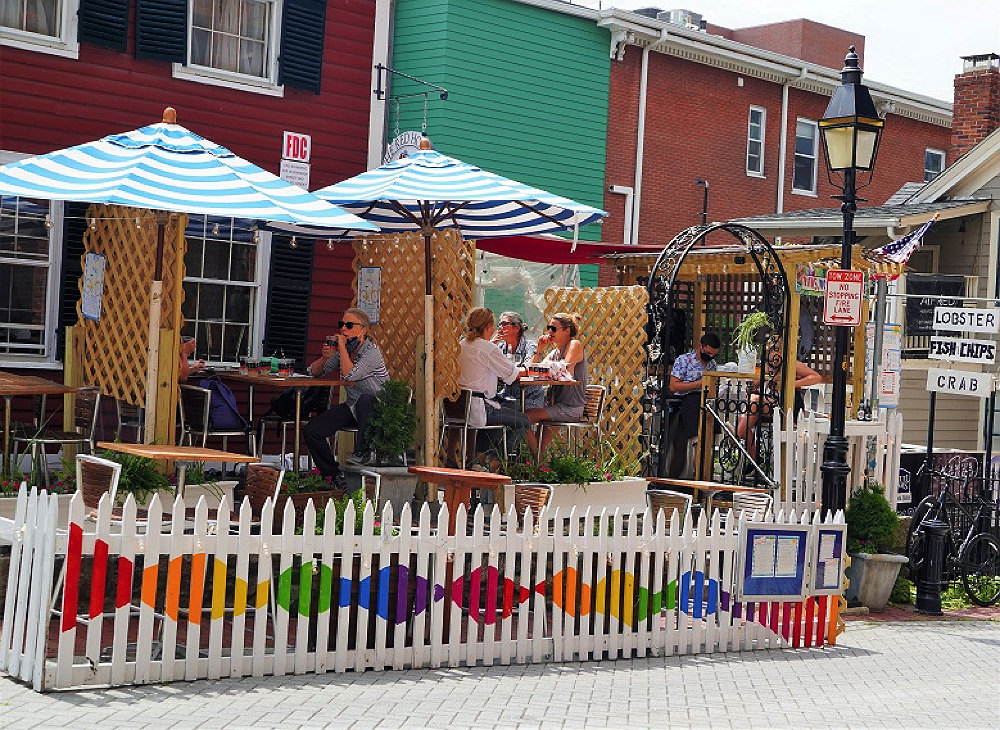
The Red House
Photograph courtesy of HSBA
While shut down, The Red House took a few weeks to renovate its interior. In April, Paul and Molly Overgaag sold fish and chips off the patio. When summer began, they transformed the outside into a summer shack with a seafood-centric menu including variations on lobster rolls. “We have a test-kitchen menu so that every week chefs can try new creations,” Molly said, beaming, “The ones that sell the most make it onto our main menu.”
The inimitable Ralph of Pinocchio’s Pizza stays optimistic about business: “At the very beginning, it was a ghost town. Things are starting to look better. Now we can stay open longer, which is great, and we deliver. We’ve been here for 40 years—that alone speaks volumes. You can eat here seven days a week and not break the bank.”
Retailers Reopening…
Retail businesses were forced to close for months before starting to reopen under the Commonwealth’s phased system of relaxing pandemic restrictions. Those that already had websites and online ordering systems could get by with some business in the meantime; others had to transition to the web quickly—but an online transition isn’t feasible for everyone.
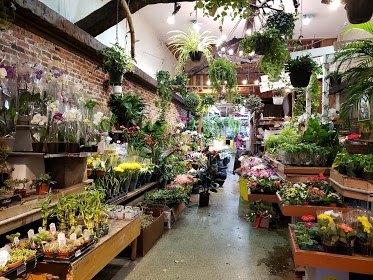
Brattle Square Florist
Photograph courtesy of HSBA
Brattle Square Florist, a Square staple since 1917, shut down from March 24 through the beginning of May, and then began to gear up for Mother’s Day. “We had a surprisingly good Mother’s Day—lots of flowers were sent since many people couldn’t be with their mothers in person,” said owner Randy Ricker. The florist can take orders online and deliver, and is open for in-person business. But, he noted, “Frankly, there’s not much foot traffic in the Square right now. We’re struggling just like everyone else.”
Lingerie boutique Forty Winks celebrated its tenth anniversary on April 10. “We’re not open for stop-in browsing, but people can make appointments for personal fittings online, and we have our bra bar for people to look at and ask for what they’d like to buy,” said owner Rachel Wentworth. “We are trying to revamp our online presence as people are doing more online shopping. We sell bras, underwear, lingerie, pajamas, and a lingerie wash called Soak that’s also really good for washing masks.”
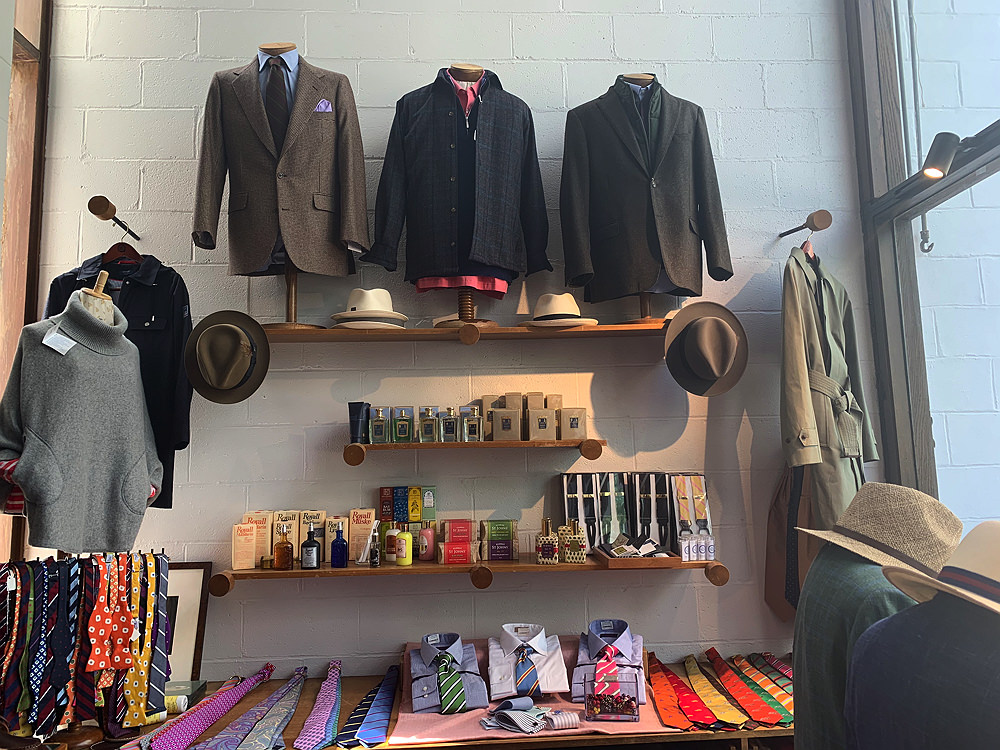
The Andover Shop
Photograph by Kristina DeMichele/Harvard Magazine
The Andover Shop has been a local institution since 1950, dressing men (and now, women) in the classic, Ivy style developed by Charlie Davidson, who outfitted famous jazz musicians, judges, lawyers, doctors, politicians, and presidents. Mark Mscizc took over the shop in 2018 with his son, Tucker. “We have a tailor shop upstairs, and another tailor in Andover that you can walk into and have your suit fitted to you perfectly,” Tucker said. The Andover Shop took a lot of time re-doing its website and building its social media while closed. “A lot of people shop through Instagram now through our increased social outreach,” he said. “Customers who used to go to Harvard or Philips Andover are able to shop from the store now since business is online.”
Another clothing store, Mint Julep, pivoted within three days to launch its website. “Both of our shops became fulfillment centers, and we were making home deliveries in our cars,” owner Brooke Garber said. The store is known for event dresses, but Garber and her team worked closely with their vendors to bring in more casual sundresses, now that people have fewer reasons to dress up. “All of our buying shows are canceled, too, so we’re picking from virtual showrooms. Everyone needs to change their business completely.”
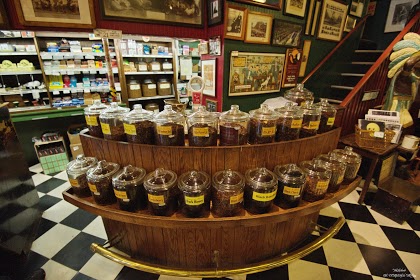
Leavitt and Peirce
Photograph coutesy of HSBA
Since 1884, Leavitt and Peirce has provided customers with tobacco and the quirkiest of games and gifts. Stephen Yocco, an employee since 1991, helped send mail orders three days a week for two months while the store was closed. The shop has been open since the beginning of June, but Yocco said that “getting the word out that we’re open is a challenge.” According to owner Paul MacDonald, who emailed while recovering from surgery, “It's survival mode for most businesses, and without University-related customers and tourists, we are left with trusty regulars—thank goodness. We are working on building our web business too, which we really need to grow.”
Specialty jewelry and home accents store Motto has been in the Square for more than 30 years, recently moving from 19 Brattle Street to Church Street. Owner Kim Teirlynck has had a couple of good days, but says that business won’t be back to normal for a while.
Laura Donahue of Bob Slate Stationer shares Teirlynck’s sentiments. “I’m a student of economics and have an M.B.A.—there’s nothing to go back to, to relate to what we’re facing right now,” she said. “Imagine what it’s like for independents who are self-funded and using their own bank accounts.” The store celebrates its ninetieth anniversary this year. Donahue acquired the shop in 2011 when the Slate family was retiring. “I didn’t want to see it go. It’s so important to have these bedrock stores that provide continuity in people’s lives with certain experiences,” she said. “We’re your favorite hangout. We like being a place to come into that feels good. I’m hoping to stick around.” Bob Slate doesn’t have an online shop, but they do take email and phone orders for greeting cards, office supplies, photo albums, puzzles, and more.
…and Bookstores Persisting
“I remember when there were 20 bookstores in the square,” says Jeff Mayersohn of Harvard Book Store. Now, there are four: Harvard Book Store, The Harvard Coop, Grolier Poetry Shop, and Raven Used Books.
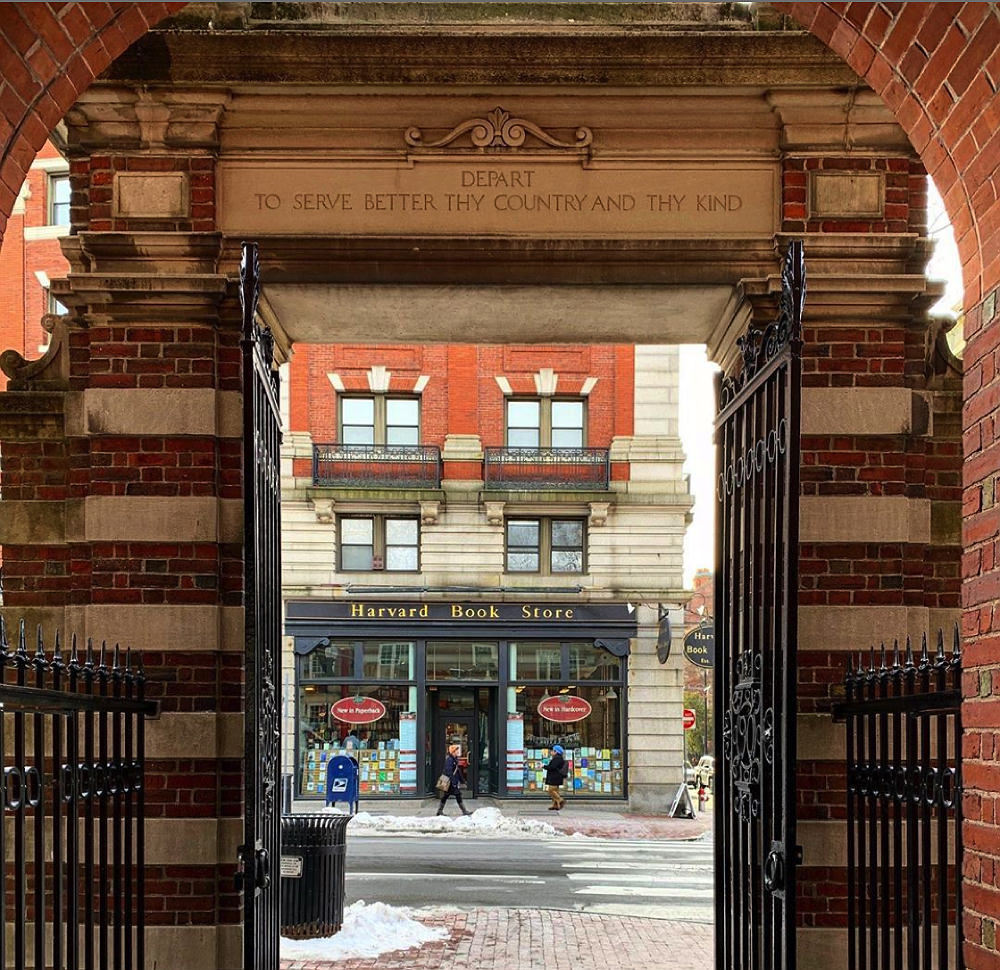
Harvard Book Store
Photograph by Kristina DeMichele/Harvard Magazine
Harvard Book Store has been fulfilling online book orders since the beginning of June and reopened to the public at the beginning of July, with 15 to 20 people at a time allowed inside. “Pre-pandemic we were holding 450 author events a year,” Mayersohn said, “Now we’ve resumed that series online and are doing one every weekday night.” The popular warehouse sale still happened this year, albeit virtually, with success. Mayersohn says event attendance has increased since the store began presenting them online. It has also resumed its on-demand printing business, which has received a large response from local writers who want to self-publish.
Grolier Poetry Book Shop has always depended on donations to survive, in addition to sales from its physical shop. But owners Carol and Ndidi Menkiti face a new challenge: “Because the store is so tiny and guests usually pack in quite close for readings, it would be virtually impossible to hold in-store events with social distancing,” Ndidi Menkiti said, explaining that online sales became their only other mechanism for generating revenue. Half of the staff are volunteers, so they do not have the infrastructure for processing and shipping online sales in volume. “The launch earlier this year of bookshop.org—an online book retailer that supports independent bookstores and offers an alternative to Amazon—was very timely and fortuitous for us,” she emphasized. “We became an affiliate a few months ago. Now, Grolier customers and supporters can order almost any book (not just poetry) through our affiliate page, and Grolier receives a percentage of each sale.”
“The Harvard Coop is still here and doing what it’s been doing for the past 140 years,” says its president, Jerry Murphy ’73, M.B.A. ’77. Its online business has kept up well, but business in the main store has suffered, and the indoor café, which shut down in March, will not open again for the foreseeable future. “We’re preparing now for back-to-school rush—even though it’s going to be remote for many, students will still need their books,” Murphy said. “Being able to buy course materials online is important. We provide hardbacks, used books, and digital copies.”
Local Music Venues
The beloved Club Passim, established in 1958 on Mount Auburn Street (where Daedalus is now) before moving to its current location on Palmer Street, has faced the pandemic with creativity and urgency. “I’m grateful for the fact that we’ve been able to bring everything we do online,” executive director Jim Wooster said, “We’ve live-streamed shows from the club with only the technical staff there to record it. It’s a little more exciting for artists than being in their PJs in their living room. We also have artists streaming from home.” Passim splits the donation revenue from the streams with artists to cover costs. The club’s school of music has also done well because people have more time to learn new instruments, and it’s able to stream more teachers from different locations. But Passim furloughed all of its front and back of the house kitchen staff. “They all mean a great deal to us,” Wooster lamented, “so it’s been hard to have the physical club and kitchen shut down.”
According to its website, The Sinclair has canceled or rescheduled shows for the time being, but will “be back soon.”
Harvard Square Hotels
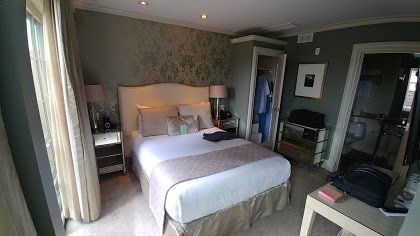
Hotel Veritas
Photograph courtesy of HSBA
Hotels had the choice of staying open to house frontline workers and displaced residents, or closing for a period of time. Both the Charles Hotel and Hotel Veritas stayed open, overhauling cleaning procedures so that all high-touch surfaces would be cleaned frequently. Things have slowly picked up at Hotel Veritas, and the Charles Hotel has hit about 10 percent capacity. “Normally we’d be full for Harvard’s move-in weekend , but we’re not anywhere near full,” Charles Hotel general manager Alex Attia said, “We furloughed many associates, and I’m grateful for our ownership group, who’s continuing to offer benefits to everyone. We have 65 percent of employees back and are hoping to bring back many more in the next few weeks as we get done with the renovations.” The Charles began a $20-million renovation of its lobby and bar last November, planning to be ready for Harvard’s 2020 Commencement. After the spring construction pause, contractors were able to re-start work the first week of June, and construction will conclude by the end of this month. The Charles Hotel’s restaurants, Benedetto and Henrietta’s Table, are operating under reduced hours.
Read more about what you can do to help keep Harvard Square businesses alive. Above all, “Use your purchasing power to support your local community. Shop consciously and shop directly,” Laura Donahue of Bob Slate emphasizes. “These are difficult times—it’s not over, and I don’t see it being over until mid next year or beyond."
Author's Note: This story will be updated on a regular basis with the latest information on Harvard Square businesses. Please contact kristina_demichele@harvard.edu with information about your business.
